News
‘Don’t panic, no need for special measures in SL’
The “mystery” virus in China’s Wuhan area has been identified this week as a novel or new coronavirus, as Sri Lankan health authorities urged the people not to panic or be alarmed as there seems to be no human-to-human transmission so far. 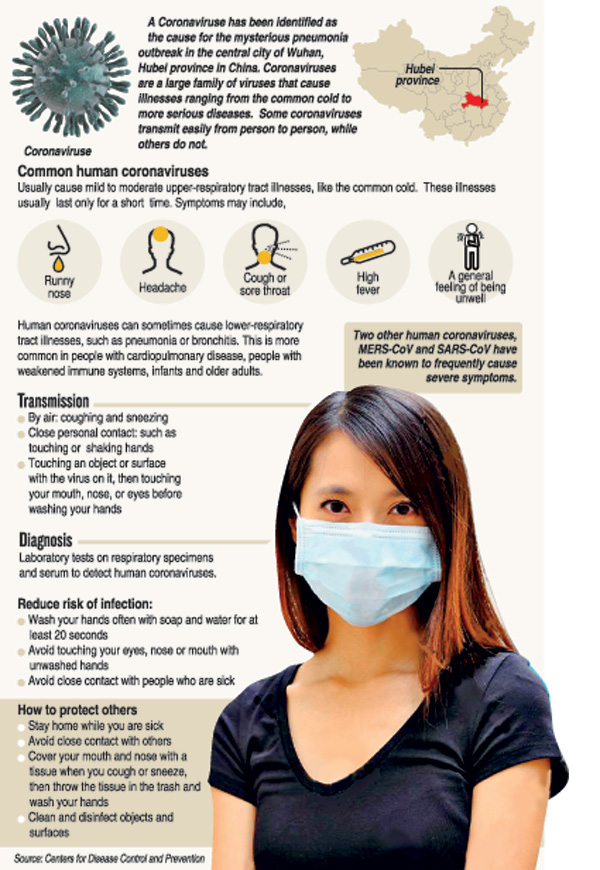
The World Health Organization (WHO) has not sent out any alerts for special precautions over the pneumonia in Wuhan. Sri Lanka is following all the usual protocols such as screening any traveller with fever who is referred to the airport’s Health Office and carrying out surveillance for any new viruses that may be circulating in the country, many health sources told the Sunday Times.
A large number of Chinese tourists and workers come into Sri Lanka regularly and many other sources were of the view that the country should be extra-vigilant as the Chinese New Year holidays draw near and people travel widely.
Nearly 60 people have reportedly been affected by this pneumonia in Wuhan, the capital of Central China’s Hubei Province.
“Coronaviruses (CoV) have got their name because the small spikes jutting out look like a crown when seen under the electronic microscope,” said Consultant Medical Virologist, Dr. Jude Jayamaha who is the Head of the National Influenza Centre at the Medical Research Institute (MRI) in Colombo.
He assured that the National Influenza Centre along with the Epidemiology Unit conducts active surveillance on viruses around the country and also on suspected unusual cases.
“We are the WHO focal point for respiratory virology diagnostics and have the capacity to diagnose the Middle East Respiratory Syndrome – MERS-CoV since 2012. We also have diagnostic kits for the common human CoV-NL63, CoV-229E, CoV-OC43 and CoV-HKU1. We can check for H5 and H7 of Avian Influenza viruses as well,” said Dr. Jayamaha.
He explained that CoVs come from four sub-families – Alpha, Beta, Delta and Gamma – and cause illness among mammals especially cats and birds. However, two sub-families (Alpha and Beta) cause mainly upper respiratory or gastrointestinal diseases in humans. In a majority of cases they cause only mild disease like the common cold but sometimes they could cause pneumonia.
The danger arises when a CoV affecting animals crosses species causing severe illness, said Dr. Jayamaha, citing the examples of Severe Acute Respiratory Syndrome – SARS-CoV (from civets) which originated in China in 2002-3, spread across the world causing the deaths of more than 700 people and MERS-CoV (from camels) which is continuing to cause a lot of illness in the Middle East.
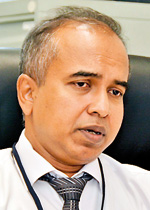
Dr. D.R. Perera
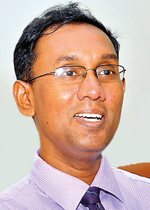
Dr. Jude Jayamaha
The Health Ministry’s Director of Quarantine, Dr. S.M. Arnold under whom comes the Health Office at the Bandaranaike International Airport, Katunayake, meanwhile, said that they follow the WHO’s direction on any disease spreading in other countries and in the case of the Wuhan illness, no extra precautions were advised. So, standard protocols are being followed.
He said that the airport’s Health Office is equipped with a thermal scanner and geared to handle an emergency.
On Tuesday, the Sunday Timessees the sensitive thermal scanner in the Health Office. The airport’s Health Unit has two offices – one on the ground floor and the other on the first floor in close proximity to the Immigration counters through which passengers pass to go out of the airport.
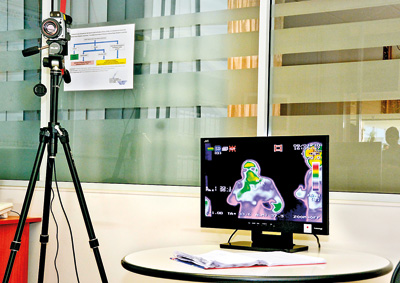
The thermal scanner recording the temperature on the computer screen. Pix by Indika Handuwala
The thermal scanner is located in the Health Office on the first floor and as we enter, it automatically indicates our temperature. A staff member there holds a glass of hot water towards the thermal scanner to demonstrate how it will respond and immediately an alarm beeps and the red section of a colour-bar lights up, in addition to showing the temperature reading on the computer screen.
The Medical Officer-in-Charge of the airport’s Health Office, Dr. D.R. Perera expands on what is done there. “Whenever there is a problem somewhere around the world, such as a new illness or the spread of a virulent illness already identified, the information is passed on to the Quarantine Unit by the airport Duty Manager, the Immigration, the Epidemiology Unit or directly from the Health Ministry, This is done by circular or phone,” he says, explaining that the WHO alerts also come directly.
Pointing out that they follow WHO guidelines and have a basic protocol for communicable diseases (CDs) under which fall fever and respiratory illness, he says that they have all the facilities. There was no alert from the WHO with regard to the Wuhan illness, as there seemed to be no human-to-human transmission.
Assuring that there is a ‘filtration’ system at the airport for unidentified diseases, Dr. Perera said if there is an alert, it could come in two forms – the need for extra vigilance where they would still follow standard protocols or the need for active measures such as screening all passengers coming from the country or region affected by a disease. This has to be done according to WHO and Health Ministry advice.
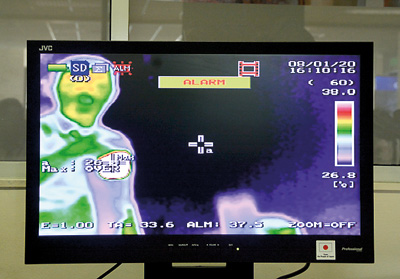
The computer screen showing red on bar when a hot water glass is held towards the scanner
He cites the case of Yellow Fever, where the Immigration authorities will check whether passengers from the region where this disease is prevalent have cards indicating that they have been vaccinated against this disease. If they don’t, then they are referred to the Health Office. “We then send them in an ambulance to the Infectious Diseases Hospital (IDH), Angoda, to get the vaccination.”
As Sri Lanka has been certified as having eliminated malaria, if a person who has arrived from a malaria-rampant country is found to have a fever, the Health Office is equipped to do blood tests, it is learnt.
Under normal circumstances when an ill passenger either comes on his/her own volition or is directed by Immigration or the airline to the Health Office which works 24 hours, 365 days, what they do is take a detailed case history. This is while the thermal scanner will indicate whether the passenger has fever, he said. Thereafter, a decision would be made whether to send the passenger to the Negombo Hospital or the IDH.
The Health Office is manned by four Medical Officers and seven Public Health Inspectors (PHIs).
Dr. Perera, however, conceded that a limitation was not checking all passengers arriving in Sri Lanka. “We cannot send all passengers through the thermal scanner unless the WHO and a particular country grappling with an issue agree to it, as it is a human rights matter.”
| Crucial to get travel history of people who seek treatment – Prof. Malik Peiris | |
| It is good to be on alert but there is no cause for panic or over-reaction. It is also crucial for doctors to take a detailed case history including recent travels out of the country of any patient who comes to them, stressed an international expert on virology, Prof. Malik Peiris, the well-known Sri Lankan SARS buster. 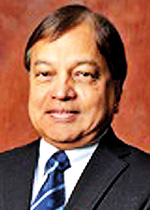 Prof. Malik Peiris When asked about the Wuhan outbreak, Prof. Peiris who is Professor of Virology at the School of Public Health, Hong Kong University, said that the infection had spread from a wet market, predominantly seafood but also game animals and there is little evidence so far of human-to-human transmission. So it is not too scary as even, for argument’s sake, if a person exposed to the virus at the market goes around, the spread is unlikely. The risk seems low and there seems to be no cause for panic. With regard to the Wuhan situation, Prof. Peiris expressed strong confidence in the competency of both the medical virologists in Wuhan and China’s Centre for Disease Control, the national institution investigating such outbreaks, in dealing with dangerous viruses. There are different levels of bio-safety containment from Level 1 (least) to Level 4 (worst). The virologists in Wuhan are capable of handling even Level 4 such as Ebola, unlike in the early days of SARS, he said. He underscored that there is a need for public awareness on diseases such as MERS but reiterated that while it is good to be concerned over exotic viruses, Sri Lanka should also heed the impact of influenza (flu) which causes much illness among people every year. Pointing out that the chances of people who have picked up some illness while abroad are more likely to go to a doctor in their area after their return, Prof. Peiris said that this is why it is important to take details of recent travels in the two weeks before that. “Take the case of South Korea where there was a MERS outbreak. The first patient who had returned from travels in the Middle East caused multiple rounds, 4 in fact, person-to-person transmission in South Korea, making 186 people ill,” he said, highlighting the need for basics much more than fancy equipment. He pointed out that when the South Korean patient came back he did not have fever but the doctors who saw him later when he fell ill had not asked for vital travel information and the patient had also not volunteered the information. When asked what measures should be taken at airports, Prof. Peiris said that there should be announcements that any passengers with fever, cough or respiratory illness should report to the health authorities, who in turn should follow protocols. Referring to basic precautions, he said that health authorities should have a strong focus on infection control and prevention in hospitals on a day-to-day basis. This should be routine but when an issue such as the Wuhan situation arises it would be good to take stock once again and go through such procedures. It should not be ad hoc but done thoroughly and the infection prevention and control regimen fortified. To the people, he says that simple precautions like washing hands regularly with soap and water would help keep illness at bay. “If you have a cough or fever – wear a mask as a courtesy towards others so as not to spread any infection, until proven that such illness is not something serious; follow ‘cough etiquette’ by coughing or sneezing into the crook of the bent area at the elbow; dispose of used tissue immediately and wash your hands before touching anything else.” |



